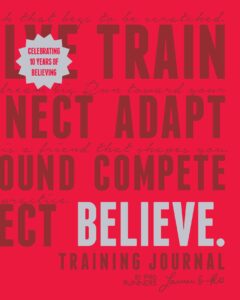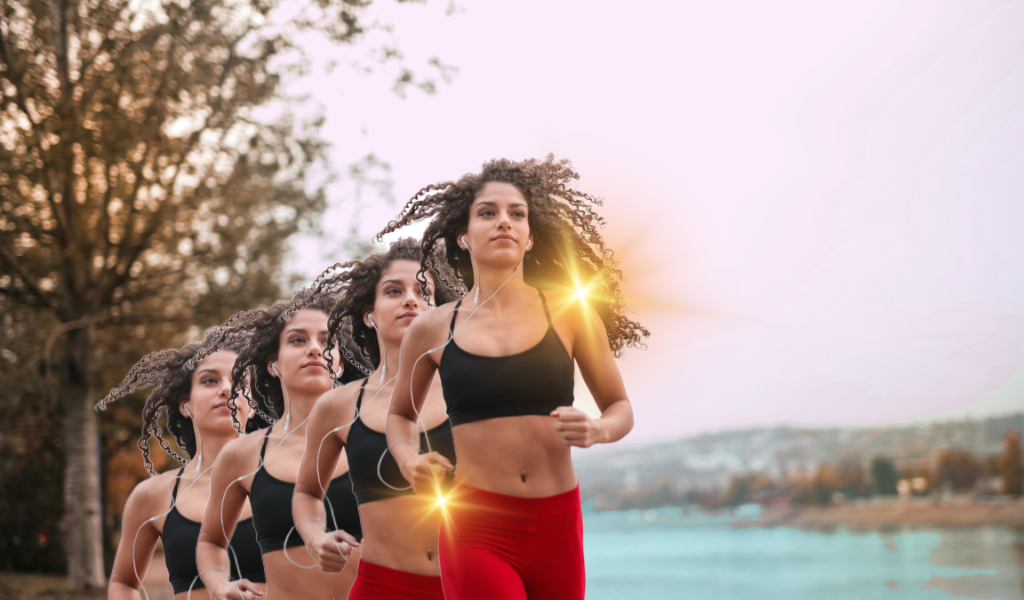If your New Year’s resolution is to start running or run more, be prepared for the “runner’s body” discussion. Take it from Lauren Fleshman and Roisin McGettingan-Dumas, who co-wrote Believe Training Journal (10th Anniversary Edition).
Follow FLEETSTREET on Instagram and TikTok.
Body image and running: Can you separate them?
People come to running for a variety of reasons: to kickstart a healthy lifestyle, find community, play outside, connect to their bodies, participate in races to challenge themselves or go for the win, or any combination of those things and more. However you find your way into the sport, it doesn’t take long before sports media and culture starts throwing a lot of talk about weight in your face.
And while running is a great sport for helping people build and maintain a healthy body, it is also a sport that has historically presented an ideal body myth and bred negative body image. These myths are so pervasive that the majority of runners, when the topic of their running comes up, have been met with unsolicited comments like, “You don’t look like a runner!” or “Yeah, I can tell you’re a runner!” These seemingly small comments can have a big impact, reinforcing the relationships between running and weight/appearance, eroding the joy of movement and distracting from the other benefits of the sport that can’t be measured on a scale.
How to make running suck less (a guide to Toronto’s best run crews).
Why everyone feels they can comment on the “runner’s body”

It’s not just one’s running status that is challenged by others due to body size. We have a cultural habit of making assumptions about one’s health based on their weight, and many people feel entitled to comment about it out of “concern” for them, or as some kind of social warrior against obesity overall. But there are a few big problems with this. First, you can’t simply measure health on a scale—you can be thin and very unhealthy, as well as fat and healthy, and everything in between. Determinations of one’s health are between each individual person and their medical provider, yet those in larger bodies often experience body shaming, health assumptions, and unwanted commentary that those in smaller bodies don’t. There are a million and one ways to be unhealthy, but most of them are invisible to strangers. Because size is visible and has been falsely tied to morality campaigns in recent history, blamed for rising health care costs, and generally stigmatized, we have internalized fatphobia as a culture.
There has been progress fighting against this with the Health at Every Size Paradigm, the body positivity movement, and increased scientific understanding of the genetic factors that influence weight, but it is not an easy task to change one’s mind. Culturally we would benefit greatly from leaving medical concerns to individuals and their doctors, tossing out our generalizations about weight and health and performance, minding our own business, and being more concerned about embracing the diversity of movement and the many changes our bodies will experience in a lifetime. Line up at any road race and you’ll see a variety of bodies ready to accomplish the task with grit and grace. Let this expand your idea of power, beauty, and possibility!
Destination run? Increasing intensity? Thinking about exercising in the heat? You should read this.
Resisting the need to fit in for running
Can you love your body and work to optimize your athleticism and ability at the same time? Yes, it’s your body and you can do what you want! But don’t be afraid to:
- Challenge the assumption that you need to change it.
- Consider the possibility that your body is beautiful and enough just the way it is.
- Gain confidence from what your body can do rather than what it looks like.
What’s gymtimidation? And, how to feel more confident working out.
Dealing with the question: “Are you enough as a runner?”
A few things I learned from clinical psychologist and body image expert Dr. Melody Moore: A feeling of “enoughness” will never be achieved by a number on a scale or clock. Enoughness comes when you can love yourself unconditionally, which is totally possible and available to you right now. And that unconditional love for yourself makes it easier to love others unconditionally. How cool is that? Think about what that does for the world. What would we choose to do if we could free up the space in our mind we’ve used to tear ourselves apart?
Canada’s elite women runners share 12 tips for racing your best.
Body Talk with Dr. Melody Moore
Five reasons to resist making small talk about our bodies
- Beginning conversations with body talk subtly conveys that our value begins (and ends) with how we look.
- Offering “compliments” can create a dependency on positive body feedback; when we don’t hear it, the absence is deafening.
- People often lose weight from illness, grief, depression, or disordered eating. Saying “you’ve lost weight!” may not be landing in a way that is helpful.
- When we show up in our body confidently without tearing it down, we give others permission to do the same. Confidence is contagious.
- It’s much more meaningful to tell someone how their actions affect you, or how they make you feel, rather than how they look. It feels better to hear it, too.
Advanced call to action for those feeling stuck worrying about what others think about your appearance: Commit to caring more about how people feel about themselves in your presence than whether or not they approve of you.
How Rihanna’s choreographer Tanisha Scott helped me get over my dance-phobia.

Excerpted from Believe Training Journal (10th Anniversary Edition) by Lauren Fleshman and Roisin McGettingan-Dumas. Copyright 2025 VeloPress. Reprinted with permission from VeloPress. New York, NY. All rights reserved.

